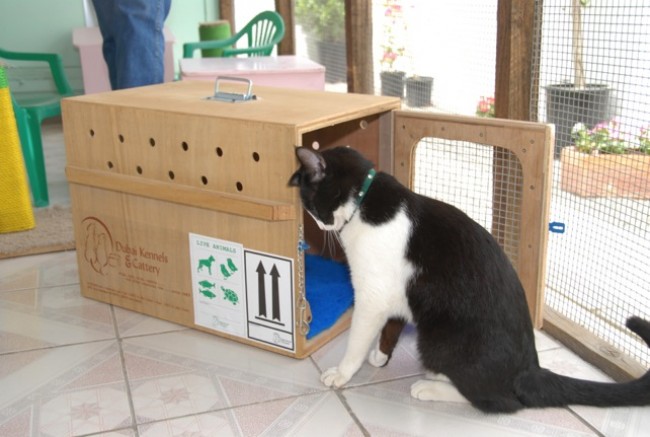and Dubai International Airport
and Dubai International Airport

Relocating to or leaving the UAE? Are you an anxious traveler? Considering your options to help quell your fears and settle your nerves a bit en route? And if your travel involves moving a pet too, are you're thinking that your darlin' also needs a little something to get her through the long journey ahead?
Well, we're here to tell you, rather categorically, that after many, many years of relocating many thousands of pets and other animals, we have very, very, rarely ever ultimately needed to sedate a pet for their trip. Yes you're worried, but think twice and then think again; giving something to help your pet settle her nerves is simply NOT a good idea in almost all cases.
You just might be asking why is it OK for you to take a little sedative before a flight and not a good idea for your pet? It all boils down to the physiological effect that anti-anxiety drugs have. And it is precisely the effects that calm nerves that can be very dangerous for animals flying in the pressurized environment of an airplane, unattended. They affect blood pressure and the central nervous system, limiting your pet's ability to safely self-control vital organ function. Although of course climate-controlled, the cargo hold can get a little chilly, and we all know how cabin pressure can change (the only relief from which is to plug your ears and blow!). All these factors can be disastrous for a sedated pet that can't react fully naturally and appropriately because, well… she's sedated. We know you want to help Fifi sit back, relax and chill out on her journey and that you only mean well, but most sedatives won't alter Fifi's PERCEPTION of her environment, they will only inhibit her ability to appropriately react to it! How frightening is THAT! She may feel a little unhappy at one point or another but because she's sedated her little tail won't work as it normally does and her yap won't yap the way she wants it too... all things that help her cope with and reduce the anxiety she might be feeling in that strange and unexpected environment.
So what can you do to make your jet-setting pet a happy flyer? An important first thing to always remember is that most pets ARE happy flyers, without you doing a thing! Yes, of course there are moments of stress and anxiety during the trip (take-off and landing, for example), and we're not dismissing that at all, but after participating in and witnessing endless thousands of shipments over the years, we see that the vast majority of pets arrive at the end of their trip not just "ok" but in fact absolutely fine, all full of beans and bubble, and either excitedly happy to see their owners or, indeed, rather casual as they saunter from their travel crates to explore their new surroundings. Really, this is the truth.
But yes, it's also true that there are a small number of pets who do react more nervously to their crates and, further, to the transport and travel process. So, indeed, what to do? Well, a number of things, actually. Firstly, just say no to drugs and then get advice from knowledgeable people who think the same way. Get her used to hanging out in her travel box at home as early as possible... even months before her flight. Allow her to sleep, eat and chew a bone in her crate and she'll soon think of her travel box as a safe place and "hers". You might also consider sleeping in a t-shirt for several nights in a row to get it good and you-smelly(!), then place that odorous garment into her travel box along with her and she'll likely be comforted by your scent throughout her flight. Another suggestion is exposure to a DAP collar for dogs (DAP is a synthetic version of a dog-appeasing pheromone released during lactation to give puppies a sense of calm and wellbeing) or Feliway for cats several weeks before travel. Feliway is a manmade version of the facial pheromone that cats use to mark an area as safe and secure. Finally, and only as a very last resort, if you and your expert advisors become certain that sedation is absolutely necessary, you must talk to your vet to plan a safe drug regime, as well as speaking to your chosen airline to get authorization beforehand because most reputable airlines simply will not allow a sedated animal onto their flights.
Office Coordinators -cum- Receptionists
Animal Relocations Officers

